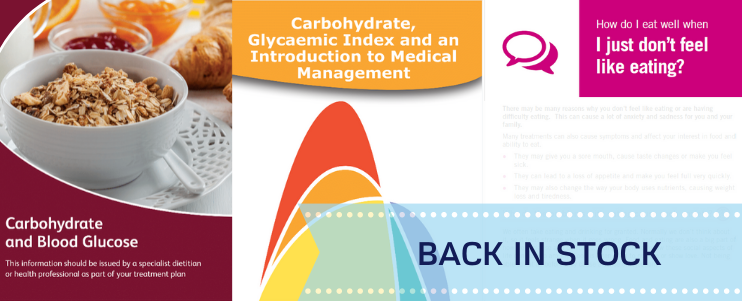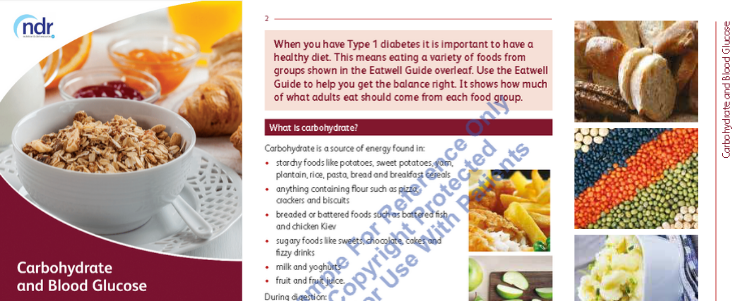Back in Stock: 9443, 9385 + 9466

Published: 05.12.19
Now back in stock:
Carbohydrate and Blood Glucose, Adult Range (9443)
Carbohydrate, Glycaemic Index and an Introduction to Medical Monitoring (9385)
How do I eat well when I just don't feel like eating? (9466).

Carbohydrate and Blood Glucose, Adult Range (9443)
A simple guide to help people identify carbohydrate in food and drink, and understand the relationship between carbohydrate intake and blood glucose.
This information booklet supports the implementation of recommendations in the NICE guideline on type 1 diabetes in adults (March 2018). Endorsed by the British Dietetic Association.
The target group will:
- know that carbohydrate comes from a variety of sources and understand which foods contain CHO
- know that carbohydrate affects blood glucose.
Carbohydrate, Glycaemic Index and an Introduction to Medical Monitoring (9385)
A booklet that explores diet and diabetes management, including GI, GL, label reading and moving from tablets to insulin.
The Target Group will
- Understand the links between diabetes and overweight/obesity; heart disease and pregnancy.
- Understand the causes and treatments of hypo and hyper glycaemia.
- Understand the secondary complications of diabetes such as Renal disease and CVD.
- Know the importance of diet in relation to the management of their diabetes including health eating, CHO awareness, lipids, food labels, glycaemic index (sugar and fibre), fruit, alcohol, eating out, weight (physical activity), portion size.
- Understand that extra consideration has to be taken when managing diabetes during illness with illness
How do I eat well when I just don't feel like eating? (9466)
Information for people with eating/appetite difficulties during palliative care/convalescense to help deal with anxiety, stress and/or conflict around eating.
The target group will know how to adapt their diet to enable them to cope with eating difficulties and challenges by:
- Adapting food choices to cope with certain difficulties with eating and drinking associated with their health and treatments
- Providing guidance to complement standard messages, adapting as appropriate to meet nutrition and hydration requirements.
- Taking action to maintain a healthy mouth.
- Increasing energy and protein intake through promotion of healthy fats; inclusion of non-processed protein with each meal; fortified, full-fat plant-based dairy alternatives and limiting/not promoting refined sugar, saturated fats and salt etc.
